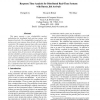Free Online Productivity Tools
i2Speak
i2Symbol
i2OCR
iTex2Img
iWeb2Print
iWeb2Shot
i2Type
iPdf2Split
iPdf2Merge
i2Bopomofo
i2Arabic
i2Style
i2Image
i2PDF
iLatex2Rtf
Sci2ools
123
click to vote
ICPP
1998
IEEE
1998
IEEE
Response Time Analysis for Distributed Real-Time Systems with Bursty Job Arrivals
This paper presents a new schedulability analysis methodology for distributed hard real-time systems with bursty job arrivals. The schedulability is analyzed by comparing worst-case response times of jobs with their timing constraints. We compute response times with a new method, which uses the amount of received service time to determine the response time of instances of a job. We illustrate how this method can be applied to exactly determine worstcase response times for processors with preemptive staticpriority schedulers, and how it gives a good approximation on the response times for processors with non-preemptive static-priorityscheduling or first-come-first-served scheduling. Our schedulability analysis method is the first to support systems with arbitrary job arrival patterns. Nevertheless, it performs better than other known approaches used for systems with periodic job arrivals.
Distributed And Parallel Computing | ICPP 1998 | Job Arrivals | Response Times | Schedulability Analysis |
Related Content
| Added | 04 Aug 2010 |
| Updated | 04 Aug 2010 |
| Type | Conference |
| Year | 1998 |
| Where | ICPP |
| Authors | Chengzhi Li, Riccardo Bettati, Wei Zhao |
Comments (0)

